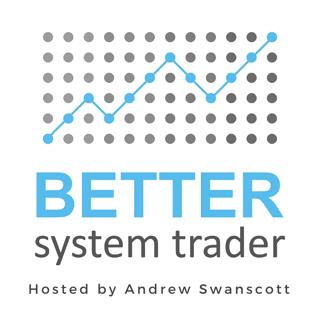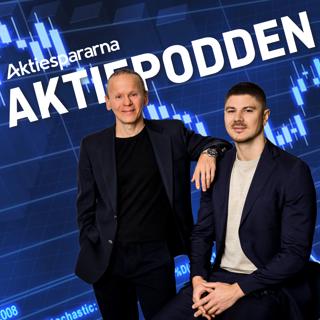
115: Intelligent strategies that maintain themselves - David Stendahl
Glad you could join us today for our chat about intelligent systems that maintain themselves. Sounds good doesn’t it? Well actually, that’s not all we’re going to discuss today, we’ve got so much more than that. Our guest for this episode is David Stendahl, from Signal Trading Group. David is a CTA with more than 20 years of experience designing and trading systems, and not only is he an international speaker and the author of 4 books but he also co-created the backtester in Tradestation many years ago. In this episode he’s got a lot to share with us, here are just some of the points we cover: How to build intelligence into trading strategies so they dynamically adjust and maintain themselves over time, The key to portfolio construction and the major factors to consider for effective diversification, Why it can be better NOT to specialise in a particular market, The main drivers behind strategies that have lasted more than 10 years in the markets, How to assess if a strategy suits your personality. Disclaimer: Trading in the financial markets involves a substantial risk of loss and is not suitable for everyone. All content produced by Better System Trader is for informational or educational purposes only and does not constitute trading or investment advice. Past performance is not necessarily indicative of future results.
20 Aug 201741min

114: How to quickly identify when an edge has gone
Last week we reviewed a technique Kevin Davey shared to measure the effectiveness of entries and exits using something he calls ‘the monkey test’. This week we’re going to look at entries and exits from a slightly different angle: How can we measure a trading edge after we’ve entered a trade, Is it possible to identify when that edge has disappeared so we can consider exiting the trade rather than overstaying our welcome? In this episode we’re going to review a technique that Dave Bergstrom uses to measure the decay of a trading edge. We pick up the conversation talking about validating trading strategies for robustness, take a listen! Disclaimer: Trading in the financial markets involves a substantial risk of loss and is not suitable for everyone. All content produced by Better System Trader is for informational or educational purposes only and does not constitute trading or investment advice. Past performance is not necessarily indicative of future results.
18 Aug 20177min

113: How good are your entries and exits... really?
Today, we’re going to have a quick chat about the effectiveness of entries, and a simple technique you can use to determine how good an entry or exit really is. I’ve been working on some breakout strategies lately and I’ve noticed in some of them that the entry really isn’t that important at all… That is, I can be pretty loose with the entry values and get similar results… So there are other components to the strategy that are actually driving the performance. Now, this got me thinking about measuring the effectiveness of entries and exits, so today I want to share a technique that Kevin Davey calls the “monkey test”. And no, you don’t need actual monkeys for this! Let’s hear how Kevin uses the monkey test to check how good his entries and exits really are. Disclaimer: Trading in the financial markets involves a substantial risk of loss and is not suitable for everyone. All content produced by Better System Trader is for informational or educational purposes only and does not constitute trading or investment advice. Past performance is not necessarily indicative of future results.
11 Aug 20173min

112: Intraday Trading with Stefano Serafini
Glad you could join us today where we get to chat with Stefano Serafini – the current leader of the World Cup Championship of Futures Trading®* I met Stefano in New York at a trading masterclass a few years back and he’s been doing some great things with his trading. As I mentioned, he’s the current leader of the World Cup Championship of Futures Trading®* Sometimes in these trading competitions you see traders rocket to the top of the leaderboard really quickly, but they usually disappear just as quick. Anyone who’s been watching the competition this year would have noticed that Stefano has been pretty consistent so far, so we’re going to discuss his trading approach, especially around intraday trading strategies and portfolio construction. In our chat you will learn: How to use filtering on higher timeframes to produce higher quality intraday trades, How ‘time windows’ can improve trading results and what to look for, How to combine multiple strategies into a portfolio and then manage it to keep the portfolio fresh and performing optimally, A common mistake traders make with correlations that could give false results and how to overcome it. Disclaimer: Trading in the financial markets involves a substantial risk of loss and is not suitable for everyone. All content produced by Better System Trader is for informational or educational purposes only and does not constitute trading or investment advice. Past performance is not necessarily indicative of future results.
6 Aug 201735min

111: Managing Monte Carlo
As systematic and algorithmic traders, we have a number of tools and processes we can use to test and validate trading strategies. For example, in-sample/out-of-sample testing, walk forward analysis, cluster analysis and a bunch more. (And don’t forget all the fancy named techniques that have been lumped in with Machine Learning that are sometimes just rebadged techniques that have been around for ages already!) Anyway, one of the tools that we have at our disposal is Monte Carlo analysis. When you’re using a tool it can be good to understand how it works... What are it’s strengths? What are it’s weakness? Today I’m going to share with you a little bit of audio from Dave Walton of Statistrade, explaining the benefits of Money Carlo analysis, and also a few of the weakness or false assumptions around Monte Carlo analysis that we really need to be aware of if we want to manage Monte Carlo effectively. Let’s take a listen to what Dave has for us. Disclaimer: Trading in the financial markets involves a substantial risk of loss and is not suitable for everyone. All content produced by Better System Trader is for informational or educational purposes only and does not constitute trading or investment advice. Past performance is not necessarily indicative of future results.
4 Aug 20176min

110: George Costanza tip for Traders
T Today I want to share with you one of my favourite Seinfeld episodes ever. It’s the episode where George Costanza realises that all of the decisions and actions he’s taken throughout his life have been the wrong ones. So he decides to do everything the opposite. He’s in the diner with Jerry and Elaine and he sees an attractive woman sitting up at the counter who seems to be interested in what he’s doing, glancing over at him. Instead of sitting back and doing nothing about it he does the opposite... He approaches the lady, announces that he’s a short, bald, unemployed man who still lives with his parents, and... She immediately goes out with him! Later on, he gets an interview for a job with the New York Yankees and during the interview he gets an opportunity to meet the owner. Instead of sucking up to the owner, he does the opposite and tells him how much the team sucks, how he’s done a poor job managing it, making stupid decisions etc, and... The owner immediately hires him! Every time George does the opposite of what he would usually do, it works out well. He succeeds. And guess what? It can sometimes be the same with trading too... Listen to find out how. Disclaimer: Trading in the financial markets involves a substantial risk of loss and is not suitable for everyone. All content produced by Better System Trader is for informational or educational purposes only and does not constitute trading or investment advice. Past performance is not necessarily indicative of future results.
28 Juli 20174min

109: Adaptive Trading Systems with Brian Miller
The markets are in a constant state of adaptation. Conditions change. Strategies fall in and out of sync with the market, causing periods of good and poor performance. So what can we do to improve consistency by making our systems adapt better to changes in market conditions? Our guest for this episode, Brian Miller, is from Optimized Trading, and in our chat he shares with us: Why implementing adaptability into strategy design is so important and some techniques you can use to create adaptive systems today, Why market classification needs to be considered and the types of approaches you can use to classify the market, How to pursue a multi-model structure that adjusts dynamically to changing market conditions, Plus much more. Note: This is the 1st part of 2 recordings, look out for the 2nd part coming soon! Disclaimer: Trading in the financial markets involves a substantial risk of loss and is not suitable for everyone. All content produced by Better System Trader is for informational or educational purposes only and does not constitute trading or investment advice. Past performance is not necessarily indicative of future results.
23 Juli 201731min

108: What Market Breadth can reveal about current market conditions
Over the last few months you may have noticed an increase in the number of articles being published on the internet using Market Breadth to predict which way the stock markets could go next. In fact, I saw one just recently that said the US stock market is set for a parabolic move. Now, as systematic traders I'm sure most of us are not really interested in predicting those types of things... However Market Breadth measures can provide us with additional insights into the underlying conditions in the market that aren’t so obvious looking at a price chart. So today I want to share with you some Market Breadth knowledge from Greg Morris, who oversaw the management of over 5.5 billion dollars. Take a few minutes now to hear from Greg about Market Breadth and what it can reveal about the underlying conditions in the markets. Disclaimer: Trading in the financial markets involves a substantial risk of loss and is not suitable for everyone. All content produced by Better System Trader is for informational or educational purposes only and does not constitute trading or investment advice. Past performance is not necessarily indicative of future results.
21 Juli 20179min





















